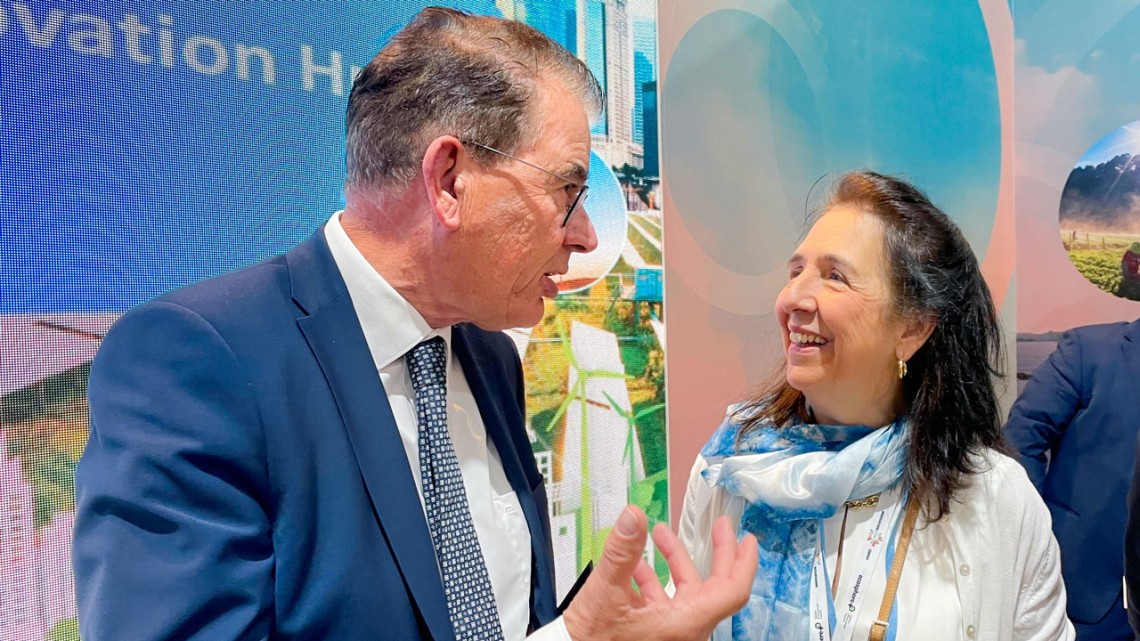
Gerd Müller, left, director-general of the U.N.’s Industrial Development Organization, speaks with Cornell engineering professor Semida Silveira at the COP27 meeting in Sharm el-Sheikh, Egypt.
Professor tells COP27 to move faster on energy transition
By Blaine Friedlander, Cornell Chronicle
For green energy on a global scale, the world must work faster.
Cornell professor Semida Silveira introduced the first official statement of a United Nations’ engineering working group – the Council of Engineers for the Energy Transition (CEET), formed by U.N. Secretary General António Guterres – to the U.N.’s Conference of the Parties (COP27) climate change meeting on Nov. 11 in Sharm el-Sheikh, Egypt.
The document seeks to create a worldwide path to accelerate achieving net-zero carbon emissions in energy by 2050.
“The world needs to move at a very rapid pace,” said Silveira, professor of practice in systems engineering, in Cornell Engineering, “and expand the scale to achieve sustainable development goals, keep the Paris Agreement targets within reach and mitigate the detrimental impacts of climate change on all aspects of human life and the environment.”
Silveira – as a representative of her group – said that CEET wants to leverage global engineering expertise to enhance regional collaboration, establish knowledge networks with U.N. member countries and seek partnership opportunities, demonstration projects and technology-transfer cooperation.
The statement said that clean, efficient and smart technologies are now available for larger-scale deployment to reduce carbon emissions while supporting progress toward universal access to affordable, reliable and sustainable modern energy.
To achieve energy progress, the statement suggested:
- Reducing the energy concentration in the economy by implementing policies and measures that leverage technology, data and digitalization to boost energy efficiency, while supporting economic growth, industrial development and global prosperity;
- Electrifying end-use items – such as heating systems in buildings, cooking stoves and passenger vehicles – that now often rely on fossil fuels and to pursue decarbonization paths for industry and heavy transport; and
- Reducing greenhouse gas emissions from energy supplies across all sectors.
“Many clean, efficient and smart technologies are available today,” said Silveira, who is also a faculty fellow at the Cornell Atkinson Center for Sustainability. “They can be deployed on a larger scale to reduce global emissions, while simultaneously supporting progress toward universal access to affordable, reliable and sustainable modern energy.”
Nearly three dozen engineers from around the world comprise CEET, which was launched in September 2021. The high-level group was created to solve the challenges of scaling technology in the global energy transition, and to recommend guidelines for countries to remain in line with the Paris Agreement.
Gerd Müller, director-general of the U.N.’s Industrial Development Organization and Jeffrey Sachs, president of the U.N.’s Sustainable Development Solutions Network, serve as CEET co-chairs.
CEET is working with global agencies and policymakers to ensure that their recommendations are sustainable, just and able to support economic development – safeguarding that positive financial results occur in people’s lives – which include the creation of new jobs in the clean energy sector.
“At the moment, we are 35 engineers from all over the world,” Silveira said. “We are united by our commitment to sustainable development. And we want to give a push to the implementation of solutions, as engineers and as citizens of the world.”
Silveira said: “Let's work together for a transformational change that will take us to the pathway that we have agreed upon and designed in the Paris Agreement.”
Media Contact
Get Cornell news delivered right to your inbox.
Subscribe
